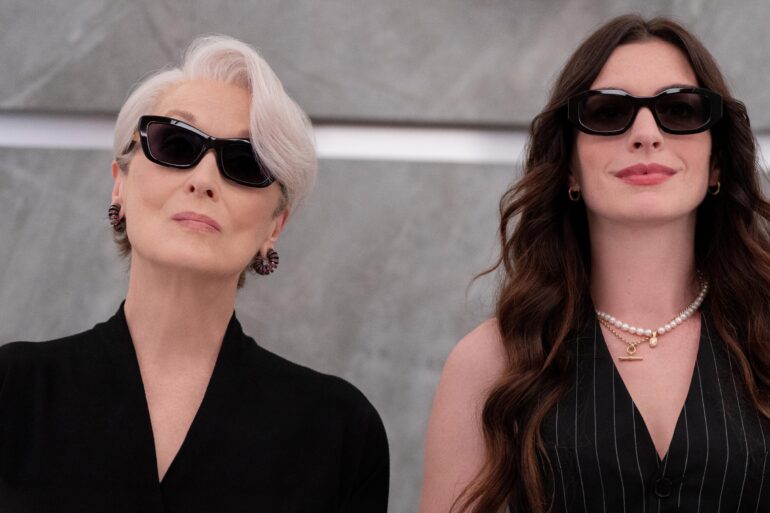Each episode honors Poe in the best way possible, a task that could only be done by Mike Flanagan and his actors.
* Spoilers ahead *
Seated from across each other, Verna (Carla Gugino) delivers a promise of clarity to the stone-cold Madeline Usher (Mary McDonnell) and one of the most beautiful lines in the series: “What is a poem, after all, if not a safe space to deliver a difficult truth?”
Similarly, an exit of one of its main characters, Tamerlane Usher (Samantha Sloyan), has her fall to her tragic end in slow motion. It is a savory scene of her rising to meet a false reflection only to break it. Shards of glass fall like raindrops from a thundercloud, surrounded by a green light, and her face still (mimicking the death of Gwen Stacy in The Amazing Spiderman 2) before she lands, impaled, on her bed.
It is a poetic dream and a beautifully horrifying thing to watch over the weekend. This series makes my top 3 in the Flanagan cinematic universe.
These two scenes reeled and hooked me to The Fall of the House of Usher, another horror anthology from Mike Flanagan. The eight-episode series tells the story of the Usher family, the magnates behind Fortunato Pharmaceuticals. At the helm of the company is CEO Roderick Usher, accompanied by his right-hand man and twin sister Madeline, along with Roderick’s children. The show opens with the Ushers being sued for the deaths of thousands due to the drugs they are peddling, and in the same breath, Roderick’s children pass away in a span of one week.
The series also pays tribute and takes inspiration from macabre poet and writer Edgar Allan Poe.
Poetry in motion



I am a horror-averse person, but Flanagan has owned my October ever since he came out with The Haunting of Hill House in 2018. No, this is not a masochistic practice. I have always admired the way Flanagan handles horror, and treats the genre with the respect it deserves.
Save for a few hits (and iconic classics), horror was always sold to audiences as stories that’ll have you out of your seat, but most of the time, the jump scares come for no reason at all. The axe falls, unconvincing makeup with trimmings of blood comes, the two bass notes on the piano plays, and the ever-present “Boo!” build most of the films we see today.
But Flanagan takes the root word of horror and runs with it beautifully. He does away with simplistic jump scares and lays on the creeps skin-deep. The horror lingers instead of leaves, and sticks. Most of all, there is the push to care for the characters, the worlds he creates, and the stories he weaves.
Above all, House of Usher is a Poe fan’s dream. I admit I had apprehensions going into this series because Flanagan flopped with The Midnight Club. It was a dent in his resume of successful storylines, and I hoped that Usher would not end up this way. Thankfully, Flanagan took Poe’s material and danced with them, bringing them to the small streaming screen with the highest of regards.
The references are so brilliantly retold, the freshest versions I have ever witnessed. Most of all, they integrate his poetry in the smoothest way possible (watch out for “The Raven” and “Annabel Lee”), and the scares, while more subdued than Haunting, are justifiable.
‘A dead, useless heart’



At the center of it all, the show’s characters are people one would wish untimely demise on. They are sociopathic, devoid of any love, mercy, or empathy, and only see themselves in the mirror. But who can blame them? They were raised with golden spoons in their mouths, despite being “starved,” as Roderick’s former paramour Annabel Lee (Katie Parker) sadly puts it. “What did you feed them with, Roderick?” she asks, dressed in black garb.
They are, in the words of Victorine LaFourcade (T’Nia Miller), people with “dead, useless hearts.” Each child gets their time in the spotlight with one episode dedicated to their character’s life and death. My favorite would have to be Episode 5, “The Tell-Tale Heart.” That story, along with “Annabel Lee,” was a favorite of mine—the persistent beating of a heart underneath the floorboards brought to life in the form of LaFourcade, a gifted cardiac surgeon.



Each episode, for me, honors Poe in the best way possible. Each is an homage to the highest degree, a task that could only be done by Flanagan, and the brilliant performances of his actors. Patterned after Ryan Murphy’s American Horror Story anthologies, Flanagan makes use of his database to play different characters in his multiverses.
I cannot name a single one who plays the best, because they are all good. They play their homespun and horrific personalities to a tee, and portray their character studies masterfully. A favorite would have to be the elder Roderick played by Bruce Greenwood, who I felt could play the deep bass role of Hades in Hadestown easily. His movement from emotive to empty is so subtly done that it is almost haunting.
Purposeful horror



Unlike the iconic jump scares of The Haunting of Hill House, House of Usher decides to focus mainly on the horrifying personalities of its characters instead. The scary bordered on creepy for this anthology, with Flanagan relying on the Jaws note to bring the fright. This is not to say that the scares did not deliver, because they did. But I love how Flanagan knows when to bring the cards out, because he knows that the story is solid enough to stand on its own.
The horrors also lie in the character’s choices. The mysterious bartender Verna, whose performance had the right balance of baleful and beguiling, reflects that to them in the most terrifying ways. She represents the Mephistopheles in this Faustian tale, and spins deals like Rumplestiltskin, except that she takes an entire generation instead of just the firstborn.



Arthur Pym (Mark Hamill) is the one who ties these horrible choices up in a bag and burns them to the ground. As the family counsel, he has seen the family do terrible things and protects them anyway (except that the Usher family had a little “deviously divine” help along the way).
Flanagan uses these characters to run the story and uses fright with precise purpose.
In the end, the show does live up to its title. Yes, there is a happy (and satisfying) ending, but there must be a fall before the fairytale comes through. The ending scenes are a bit comical (must be the makeup, sadly) but they are still scary nonetheless.
All in all, House of Usher delivers on every point in its premise. It is a poetic dream and a beautifully horrifying thing to watch over the weekend. This series makes my top 3 in the Flanagan cinematic universe. I hope it makes yours too.
Catch The Fall of The House of Usher now streaming on Netflix.








